I’m going to start off by saying that Daredevil season three is a masterpiece, and I desperately want a season four. I went into the new season worried that the magic had faded—Defenders was only okay, Daredevil season two had a lot of issues, and the recent cancellations of both Iron First and Luke Cage puts the Netflix corner of the MCU on shaky ground—but from the opening scenes the show had me hooked. Honestly, as far as a continuous piece of tightly-woven, cohesive storytelling, this might be even better than the first season of Jessica Jones. It also might be the first of the Marvel/Netflix shows that has earned its thirteen episode roster for me—while not every episode is perfect, I don’t think there’s a dud here, and if anything I think it could have used another hour.
So with that out of the way, on with the non-spoiler review!
Basic Plot Elements
Matt Murdock survived the collapse of Midland Circle, which even the rational Father Lantom calls a miracle. The first three episodes really lean into Matt’s spiritual journey, and the show trusts us to come with them as he slowly recovers, nursed by the nuns at his old orphanage—in particular Sister Maggie, who seems to take a special interest in him. Matt’s deaf in his right ear, his spine and hip are banged up, and he can’t smell anything. Since his senses are on the fritz he can’t really Daredevil yet. He refuses to call Karen and Foggy, he’s furious with God, he misses Elektra, and feels like everything he’s fought for has been for nothing. He’s decided that he’s going to keep fighting, but bleed only for himself, rather than trying to be God’s soldier.
Throughout his recovery, Sister Maggie supports him, snipes at him, yells at him, helps him practice boxing, and generally behaves like the Platonic Ideal of Nun-dom. She doesn’t take his shit, and as their own relationship complicates we can see that we’ve possibly gained a new Sister Confessor, essentially, to match Father Lantom. Who is also back, and AWESOME.
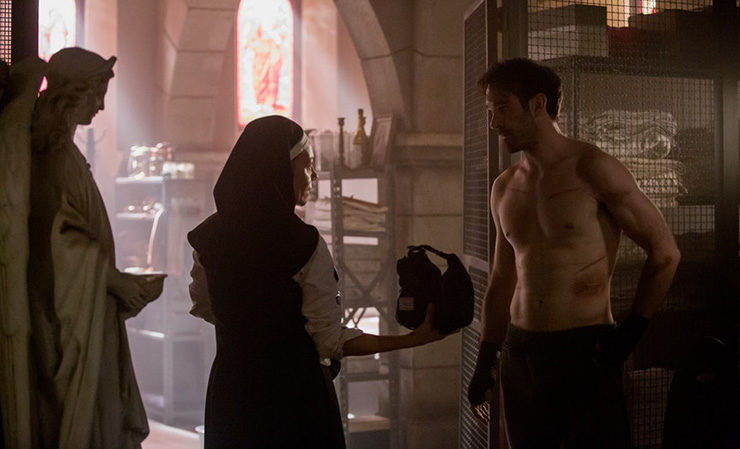
At some points Matt sounds like a whiny Recovering Catholic, [“You know what I realized? Job was a pussy.”] at others he sounds like a newly minted nihilist [“I’m Daredevil. Not even God can stop that now.”] but at all times the show takes his pain seriously, just not the way he wants us to. In some ways his relationship with God is the most important relationship in his life, and he feels like he’s been betrayed. He also, occasionally, feels like he’s the betrayer—there are at least two times when he nearly commits suicide. His constant internal monologue over whether or not to kill Wilson Fisk wraps around his anger with God in a way that gives both conversations more depth, and new angles. This is not simple a retread of Season One. Like most martyrs, there’s a fair amount of arrogance at work here, as well—Matt’s gone a bit beyond the freshman who’s come home an atheist for Christmas break, however. He thinks he’s seen God’s True Face, that of a vengeful despot who just wants to punish him. “In front of this God, I’d rather die as the Devil than live as Matt Murdock.”
Come to think of it, this God sounds kinda like Wilson Fisk.
Speaking of whom, Fisk works out a deal with the FBI to be released into the penthouse of a hotel on house arrest while he turns over evidence on various crime syndicates. Supposedly, this is all for Vanessa’s benefit, so she won’t be prosecuted as a conspirator… but it’s Fisk. The feds go for the deal, and the first thing Matt hears when his ears finally heal is the news of Fisk’s release. The clash between Matt and Fisk plays out in Matt’s ongoing internal monologue—he’s haunted by Fisk, who asks: “God returned your hearing just in time to hear my name chanted by the crowds. Just in time to learn in the long run, I won! You lost! Does that sound like God’s forgiveness?” and “Wouldn’t that be something? If I became more valuable to this city than you ever were?”
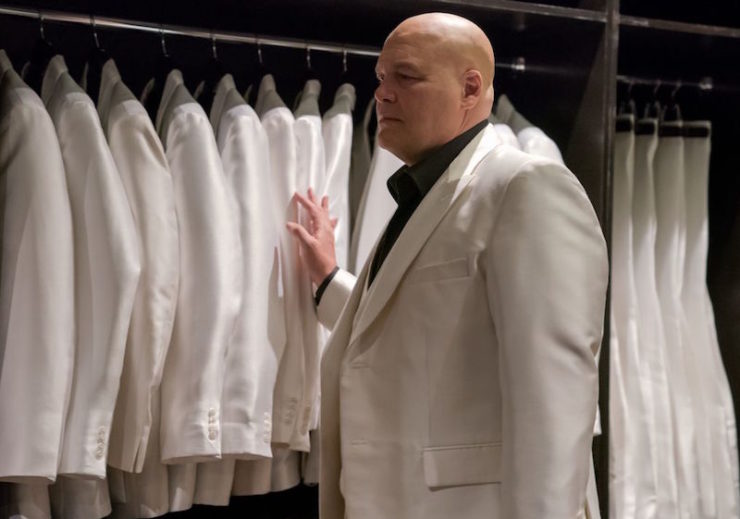
Matt loses again and again, beaten to a pulp. Karen tries a Matt-style sacrifice play only to be pulled back from the brink by Foggy Nelson. Foggy tries his own power move, only to be dragged back down by Fisk’s attack on his family. We see people’s morality chipped away because they’re financially compromised, they get bad loans, their healthcare is cut, they can’t offer middle class lives to their wives and children, their credit cards are declined. we see people who are morally screed because they cant get decent mental health care. We see people who are compromised because they can’t afford a decent education, and are mocked and derided by their families for forgetting their roots if they want to use their intelligence—as though intelligence is a liability.
The Catholic church is once again presented as an uncomplicated sanctuary, a place of ultimate Good that hold itself apart from the evil and corruption of Hell’s Kitchen. The orphanage that took Matt in raised him well, the nuns and priests loved him, and there’s never any hint of abuse. The Church takes Karen Page in without a second thought, and shields her from Fisk and Bullseye, despite her hostility to religion. Maggie is seemingly allowed free reign over part of the church, with never even a hint that as a woman she might not have the same level of power and freedom as Father Lantom. (There’s also never a hint that maybe the head of the diocese might show up and ask what the heck they’re doing with their time, since they’re having constant heart-to-hearts with Matt instead of preparing sermons or teaching CCD classes.) Likewise the NYPD are presented as good, self-sacrificing, salt of the Earth people (as opposed to those fatcats in the FBI) and are never implicated in anything like, say, unfair stop-and-frisk procedures. I don’t mean to sound snarky here, by the way, it actually made for a nice viewing experience to see that in the midst of sickening corruption, there were some institutions that tried to toe a moral line. I just also found it interesting that the showrunners and writers chose to balance their extremely progressive stances with reverence for a couple of more traditionally conservative institutions.
Superhero Action
But enough of this, I hear you saying! How is the action???
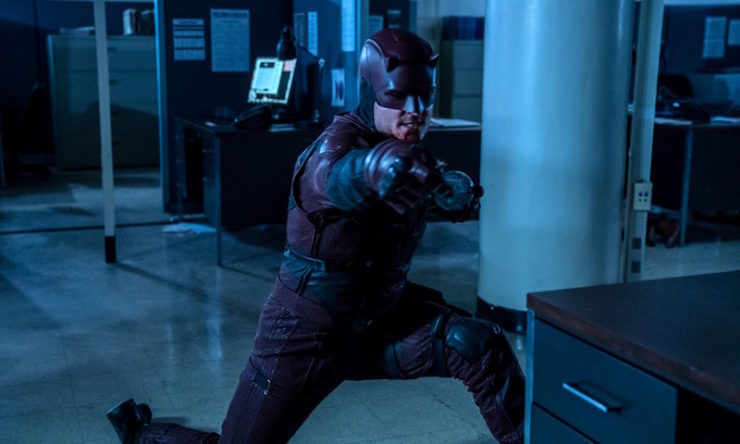
I am, personally, a fairly extreme pacifist. Maybe because of that, I LOVE fight scenes, and this season gives us two that easily match The Hallway Fight of season one, and then, in one long, no-cut, breathtaking, panic-inducing sequence, makes The Hallway Fight look like a brief argument at a youth group meeting. It never hits the level of gratuitous brutality in earlier seasons, and these three fights—with Bullseye; in a prison; and in a parking lot—show both how much Matt has improved as a fighter, and how dedicated he is to trying not to kill. Unlike in previous seasons where ninja death seemingly didn’t count, when he’s gratuitous in season three, he gets called on it.
One fight in particular was important to me, but it’s a little spoilery, so skip down four paragraphs if you want to avoid knowing anything about Episode Six, “The Devil You Know” (To make it easier, I’ll white out the spoilery text; highlight to read.)
Here’s an interesting thing: I saw the initial fight between bullseye and Daredevil as a setpiece at New York Comic-Con. In that context, and out of the show’s context, it was simply a masterful, breathtaking fight between two evenly matched people with very different fighting styles. Foggy steps into the room and watches as Bullseye pulls a knife out of a victim’s neck. Then Matt rescues Foggy, who runs into another room with Karen. The fight is amazing, but where they cut the scene it looked bad but not impossibly so. In context, however, we see Bullseye slaughter an entire roomful of journalists who are just sitting at their desks putting in their day of work.
You know, the thing I do in my office each day.
Then Matt barely saves his best friend, and gets his ass KICKED. Bullseye wounds Foggy and Ellison, murders Karen’s key witness, and leaves her untouched, physically, but terrified and implicated. Matt barely escapes.
It’s impossible to watch this scene and not think of attacks on real world newsrooms by real terrorists.
Character Arcs
Rahul Nadeem is an FBI agent put on Fisk detail. He shows us the economic side of the problem. He’s in debt up well past his eyeballs, his FICO score is a disgrace, and he’s been passed over for promotion for three years because he’s a “recruitment risk.” How did this happen? On the one hand, his sister-in-law’s health insurance rejected her when she got cancer, and he’s been paying her bills. On the other, he’s desperately trying to keep his family in the middle class suburban bracket they’re used to. His son is starting to notice that all of his friends have more stuff than he does, and his wife has had their credit card declined when she buys groceries. When he finally gets Fisk to talk, and flip on an Albanian crime syndicate, it looks like this could be the path out of crushing debt he’s been hoping for. Of course, with Fisk, things are never that simple—he’ll promise you anything you want, but he has his own agenda. He does not have your best interests at heart.
And yes, I said Albanians. Having worked through the Chinese, the Japanese, the Russians, the Irish, the Mexicans, and a non-racially-identified biker gang, the Albanians are the next crime syndicate to be vilified by Daredevil. (Assuming the show does come back for Season Four, I fear for the Norwegians and the Canadians. I think they’re all that’s left.)
The other major addition to the cast, FBI Agent Poindexter, shows us another part of society that’s been abandoned. Dex has had mental health issues his whole life, and lost his family at a young age, but unlike Matt Murdock he didn’t ever get the support network of loving nuns and Father Lantoms and best friends who would follow him over a cliff. He’s alone, left without the mental health care he needs, because it’s easier for people to look at the image of health and professionalism he projects rather than digging deeper. And so he continues to fall and flail into his illnesses with no net to catch him.
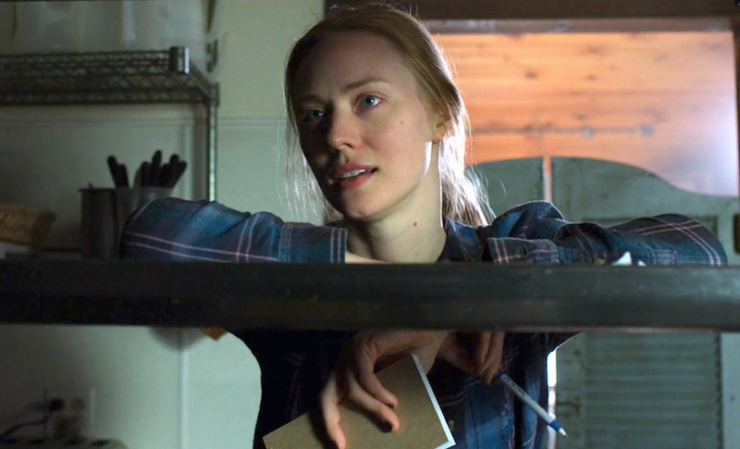
We finally see Karen’s origin story, in an episode that is worth the price of admission all by itself. The episode feels like it was imported from another show in the best way, because it gives us a version of Karen we’ve never seen. (It actually reminded me of “Git Gone” from American Gods’ first season.) While Matt and Sister Maggie argue endlessly over whether a person can change, Karen’s episode shows us that they absolutely can. It deepens her backstory, and more than pays off all the hints we’ve gotten—not in a gratuitous way (::cough::FrankMiller::cough::), but one that that gives all of Karen’s previous storylines more resonance. I actually went back and re-watched the Daredevil pilot just to track Karen’s character, and even then Deborah Ann Woll’s acting gave us flashes of what Karen had been and what she’d become. Her fight in season three with Fisk is emotionally rooted in what happened between her and Fisk’s right hand man, Wesley, back in the first season. She uses journalism right up to the moment it doesn’t work anymore, and then she goes for pure brute emotion in an astonishing scene between her and Fisk.
Foggy believes in the law. Freed of his need to play Matt’s sidekick, he uses his newfound confidence and sharp-ass suits to take on Blake Tower. Tower’s running for D.A., and caved to the Fisk deal, and Foggy goes after him like a good-natured bulldog,. He uses people’s tendency to underestimate him to the hilt, and it’s the first time we can see him really making it as a person outside of Matt’s sphere. (Plus Marcie’s back, and great, but she’s not in the show enough.)
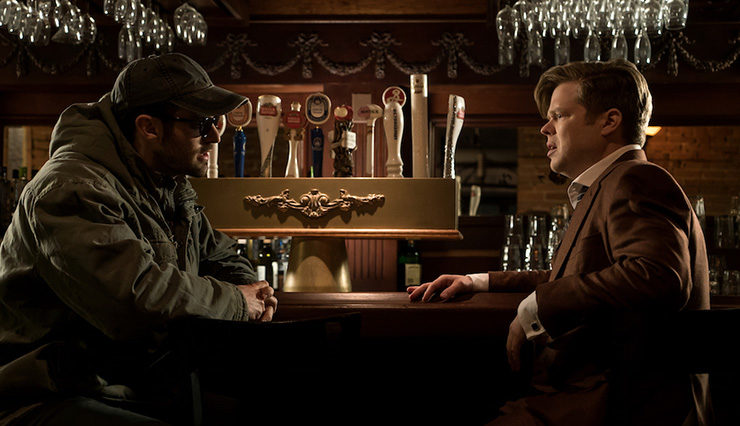
But here’s what makes the show great, aside from all the fights and emotional heart-to-hearts: Daredevil Season Three commits to the importance of fighting for good, even when the fight seems beyond hopeless, even after the heroes have lost and the villains have won on every front.
And at no point in the season does it ever, ever make that look easy.
It would have been easy to make a fun, action-oriented Daredevil season, to give us more Foggy quips and Matt being tortured about morality an an emo way. Instead, Matt’s spiritual despair is given real weight, and Foggy and Karen display more bravery and depth than even they’ve ever shown. It gives us complicated new villains and allies. It weaves in a long game argument about the value of art, culture, and education in the face of mobbed-up materialists. And at the center it shows us a furious, abused, abusive, blowhard autocrat who wants to feed the public lies and set neighbor against neighbor, all for his own financial gain and ego inflation. What the show does so beautifully is look at one giant problem—this autocrat—and follow each thread of the web he’s building. The heroes each fight in their own ways, and the show treats each battle as vital to the war. This isn’t just Matt Murdock: Tortured Hero for Free anymore. It’s Murdock and Page and Nelson and each street-level civilian who stands up against Fisk. The show gives us a fight that looks hopeless, and celebrates the fact that they all fight it anyway.
Leah Schnelbach just wants to hug Matt Murdock so hard by the end of this season, you can’t even imagine. Come join her in The Hallway Fight that is Twitter!










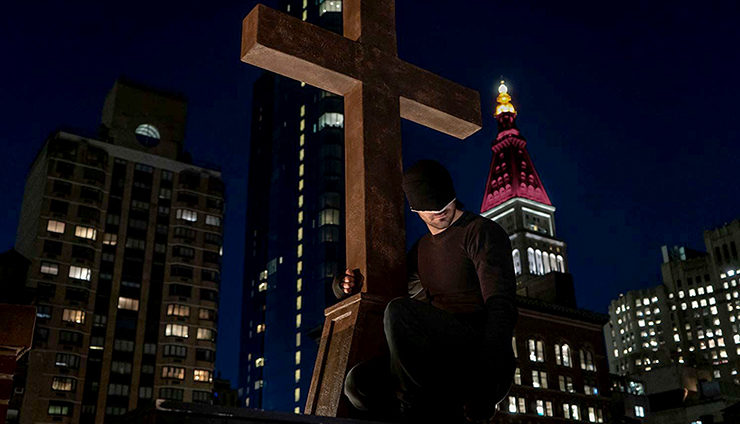
It was a good season, very engrossing, and beautifully executed. A few complaints here and there, but overall, good quality. Ray Nadeem was the breakout character this season, and Foggy is as always, awesome.
Crime syndicates do not need to be vilified, they already are crime syndicates (I get you’re trying to say they’re vilifying ethnic communities, but it came out wrong) .
Umm, your whited-out spoiler for episode 2 IS NOT EPISODE 2! I’m on episode 4, I think. So thanks for that. Oh, and this non-spoiler review is chalk full of spoilers. Not sure why it’s labeled as non-spoiler…
I like that they’ve circumvented the trope of evil lawyers (& ex-girlfriends) with Marcie through each season, she actually really cares about Foggy.
The fight in the prison really did up the ante, which they’ve done each season. Season 1 gave us the awesome single hallway fight, season 2 brought that into 3 dimensions with the stairwell. While this one wasn’t as amazing a fight sequence as those two were, it had more stakes involved and felt a lot more dramatic and less of a set piece.
All of the fight sequences felt more real, with them stumbling about as they get tired, and devolving more into brutal swinging fists than any sort of smooth stylistic presentation. They were close, intense little moments of furious action.
Contrary to popular belief, Third time can certainly be the charm.
@3 – BonHed: Yeah, I’m glad Marcy escaped those tropes.
The fact the the Catholic Church and NYPD are shown as complete white hats with no muddying of the waters with real-world controversies is incredibly refreshing. This is the way things should be.
Very good season. Very dark, but fittingly so.
I really agree that the NYPD, especially, was portrayed well. I feel like they’ve earned the ability to show the NYPD as (mostly) non-corrupt, after several seasons of Netflix MCU shows that end with various corrupt cops being taken down in some fashion.
The Daredevil vs Bulleye fight in ep 6 is so amazing. Danny looks like an amateur compared to them.
I gotta say, it was a bit unbelievable that NYPD was so spotless, and when Sister Maggie said “the Church has been protecting people for 2000 years” I laughed out loud.
@10. Magnus: Yeah, the church as an absolute good is iffy. This season may have been written before the latest revelations in Pennsylvania, but it’s been clear for many years that it’s corrupt and participates in cover-up and protection of criminals.
Was weird re-watching Paul Newman’s The Verdict the other night. The whole David versus Goliath struggle of that movie presumes the integrity of the archdiocese he’s suing. It plays very differently today, where their guilt is easy to accept from the outset.
” (Assuming the show does come back for Season Four, I fear for the Norwegians and the Canadians. I think they’re all that’s left.)”
Don’t forget the Romanians! (John Oliver voice): They’re the worst! The absolute worst!
Haven’t watched this and not likely to for a couple months. (We’ve been displaced by a fire and living at hotel with low bandwidth and limited cable.) But I worry for it’s cancellation along with the two other Marvel shows so far.
Just guessing from things I’ve read, but this sounds like another case of dragging out and delaying what fans want to see. It may be serious in its intentions while examining complicated themes, but if it delays Matt wearing the Daredevil outfit till next season, it may spell trouble. Or if Bullseye spends this entire season in the Daredevil outfit without getting his own distinctive one.
These may seem minor, but I’m starting to think that reluctance to embrace the comics roots is hurting these shows. Iron Fist ended on a high note which really should have come in the middle, or sooner. The Davos story was not enough to carry the season. Similarly, JJ’s Jekyll/Hyde mommy story was stretched like taffy. I have less trouble with where Luke Cage ended up. Found it interesting, in fact, but it’s not necessarily a good bridge to another season. Even Punisher S1 can be viewed askew as an extended origin story of Jigsaw.
Viewers may just want to see heroes heroing, dammit. Enough of this dark mirror, conflicted soul stuff.
@10 – Sunspear: Many years? :) I’m more talking about the Church actively persecuting and torturing innocents over the past several CENTURIES.
And while the season was good, regarding the costume situation (spoilers): yes, Matt never wears the red costume in the season, and Bullseye doesn’t get his own. It’s really annoying, considering DD already has his suit from the first season, and then spends Defenders and this season without it, plus the fact that they never gave Iron Fist (the one character that actually has a costume built in into his role) his suit.
I don’t mind conflicted soul stuff, but the lengths towards embracing the comic book stuff to which the shows do go only make the specific areas where they avoid it look more out of place. This season has a couple of wacky moments that make me go “oh, this is what you chose to show/do, but not that other thing from the comics?”.
Sorry to hear about the fire and your living situation. Hope it gets better soon, and that nobody got hurt.
I have no problem with the way the church or the NYPD was portrayed in this 13-episode series based on a comic book. Not everything needs to mirror the real world. Not everything needs to make a Grand Statement. The church? This was one church in fictional New York. The characters involved were one priest and one nun. What did you want them to do, reveal that Father Lantom was a pedophile? That Sister Maggie was making child porn? Would that have made the show better for you? Would that have satisfied your “progressive” sensibilities?
As for the cops, what was their role in this? Their union needed to support Foggy, and they needed to show up and arrest whoever needed to be arrested. This wasn’t a show about corruption in the NYPD. We didn’t need a Grand Statement about how there are bad cops on the streets; we know there are bad cops on the streets – both in real life and in the Netflix MCU. But there are good cops, too. And this series just needed the good ones to show up and do their jobs.
I’m as progressive as anyone reading this comment – more than many, I’d wager. But I can’t abide the kind of mentality that says we need to vilify religious institutions and the police at every opportunity just because there is corruption in both organizations. The corruption needs to be rooted out and the organizations fixed, it’s true. But many, in both organizations, still do good work, and that should be recognized.
Because recognizing the good is not the same thing as giving a free pass to the bad.
That’s not what I was saying at all, but sure.
I wasn’t addressing you, MaGnUs. I was addressing Leah, the author. While I agree with 99% of what she wrote in the article, and I loved the season as well, I’m not down with her view on how the church and the NYPD were portrayed.
That’s not what she said either.
@Magnus: Thanks for the kind words. There were 18 condo units involved in the fire and everyone got out safely. That’s the most important thing. Stuff is just stuff.
The funny thing is 3 or 4 other neighbors are at the same hotel, so we still run into the same people.
MaGnUs, that’s exactly what she said. From paragraph 7:
It is, apparently, a “progressive” stance to take shots at the church and the NYPD even when the story doesn’t call for it. But I’m not going to argue with you. You’ll hear what you want to hear.
@16 – Sunspear: Yeah, as long as nobody got hurt… well, you can complain about stuff, it was your stuff. :)
I thought having the Albanians being vilified was ok, for too long now Holywood has cast British actors as it’s villains! Going right the way back to Lost in Space (or before?)!
@17: You seem to be the one hearing what you want to hear. In all that you quoted and bolded, you seem to have missed where she said the choice made a nice viewing experience. Remember when you said, “What did you want them to do, reveal that Father Lantom was a pedophile? That Sister Maggie was making child porn? Would that have made the show better for you? Would that have satisfied your “progressive” sensibilities?” You seem to be believing that the author of the article considered that a flaw, when she explicitly called out the choice making it a nicer viewing experience. She just also said that it was interesting that in a show so progressive in other areas that they also chose to paint typically very conservative organizations as unquestioningly noble and good. That, btw, does not mean “it’s a ‘progressive’ stance to take shots at the church and the NYPD even when the story doesn’t call for it,” even if you choose to read that into it.
Also, whether a story ‘calls for it’ is also a factor that is shaped by the writers. They don’t just insert individual ridiculous scenes of the type you describe that would villify the Church, they build the story from the ground up (adapting it from comics, in this case) that includes flaws. If they wanted to show the NYPD as just as potentially corrupt as the FBI under Fisk, the story would have called for it, Foggy wouldn’t have gotten the NYPD’s near-unanimous backing and instead got his support elsewhere. They didn’t do that. That was a choice. A choice the author of this article thought was a good one, in the end.
OP:
It might be worth pointing out that, at least for the NYPD part, they were portrayed as so entirely corrupt in Season 1 and 2 of Daredevil, that there were literally not enough police left after the purge to help out in other MCU Netflix shows when needed. And given what happened, its no wonder that the NYPD are currently toeing the line on the right side, given what has happened in their city, and specifically with Fisk, in the recent past.
As far as the Catholic Church — that’s likely more of a genre idealization at play.
I’m generally pretty enthusiastic about the way Marvel/Netflix handled their shows this year. S2 of LC and IF were much better than S1. S3 of DD was maybe not quite up there with JJ1, but it was damn good. The only failing, if one could call it that, was that JJ2 couldn’t live up to the standards of JJ1. Not that it was bad, but maybe … disappointing. Overall, though, all very well done and I’m even sad that they’re canceling IF, which I never thought I’d say.
Watched this in a marathon and enjoyed it immensely. I loved that Matt, Foggy and Karen are their own people and not simply different 1 dimensional characters. I enjoyed the whole turning the FBI on it’s head trope.
What I did find difficult was the whole “why is God doing this to me and what is his plan for me?” whining that Matt was doing. I get that being injured and feeling that everything he had achieved in season 2 was for naught made him depressed and question his whole existence, but I did get a bit annoyed at his assumption that he was the centre of God’s plans for him.
I also loved the reveal about Sister Maggie.
Having read the originals and followed the whole Elektra, Kingpin, Bullseye season I can see similarities and changes. One of the many things that had to be changed to update the story is the reliance on smart phones and this was done intelligently.
Looking forward to season 4 now. :)
@21 – Anthony: The NYPD being this way this season might be less a thing of a clean, uncorrupted department, and more of them angry at Fisk for causing the deaths of some many of their colleagues in the previous seasons.
So finally finished this yesterday. Really enjoyed it overall, consistently good quality, and Karen vs Fisk was astonishing.
On the Catholic Church protecting people for centuries, that is perfectly true. Nowhere does she say they were only protecting *good* people.
Also so agreed that it was nice to see that this particular precinct of the NYPD seems to have earned a measure of redemption compared to the corruption shown previously and even again in LC2. The cops aren’t angels, but they can be responsible people with jobs who just want a win occasionally
@26 – Mayhem: You’ve got a point about the Church.
Refreshing?? I found this scenario rather stupid and unrealistic. Even for fiction. Is the new showrunner some kind of right-wing zealot? It sure feels like it. No wonder I can’t stand this third season.
What a terrible season. Season Three of “Daredevil” was absolute crap to me. The season never explained who had saved Matt Murdock’s life after the events of “The Defenders”. The creation of Bullseye was like a rush job. And he was dour as ever. He spent most of the season being traumatized by what happened in “The Defenders”, without anyone finding out who had saved him. And he made some really stupid mistakes. Yet, at the last moment, he suddenly became this chipper, uber competent vigilante without any real explanation for his change in attitude. Did we really need Kingpin again? I didn’t. Nor did I need the manner in which he took control of the Manhattan branch of the F.B.I.? What was that? That was so unrealistic that by the ninth or tenth episode, I found myself rolling my eyes in disbelief. How could a convicted gangster, who had lost most of his money while in prison, managed to gain so much control over the F.B.I. via one sharpshooter? Seriously? There weren’t any other sharpshooters in the F.B.I.? And then there was Foggy Nelson and his decision to run for District Attorney . . . in order to save his ass from the Kingpin. I had to watch, while he literally pushed the idea of an uber-militant police force. It’s bad enough that the season painted the F.B.I. as the bad guys with the black hats (or easily manipulated) and the New York Police as this dedicated group of good guys. But an even more militant police force? What was Foggy trying to do? Create an American version of the Gestapo? I’m still amazed that I used to like Karen Page back in Season One. I’m still trying to figure out why the showrunners thought she was capable of changing careers so quick in order to become a journalist. I thought the flashback about her past would explain this, but it never did. Speaking of which, why was there an entire episode about Karen’s past. It had nothing to do with the season’s main narrative. I LOATHED the scene in which she had pulled a gun on this group of black men for heckling another woman. The thing is . . . Karen had pulled this stunt after the woman had managed to walk away from them. The racism in this scene really irritated me to no end. But . . . it is typical of “Daredevil”. I would discuss Ray Nadeem. I would love to. I rather liked him and wished he could have been the main protagonist of this story. Alas, the show runners made him this pathetic victim of the Kingpin, who ended up murdered.